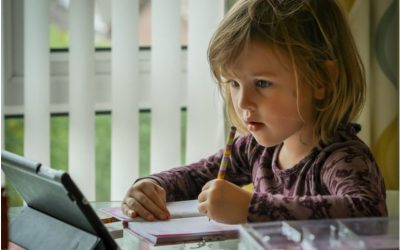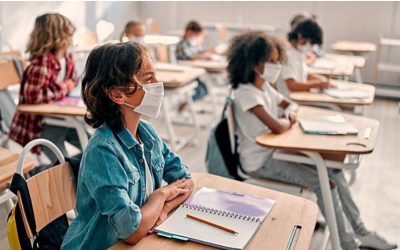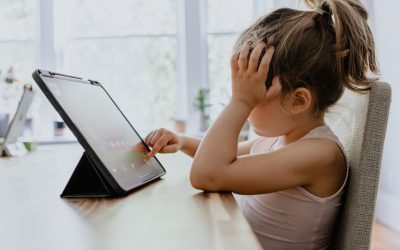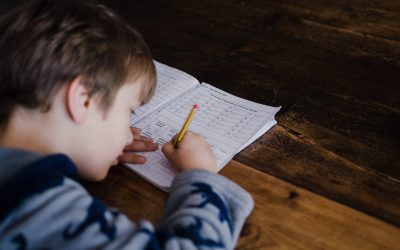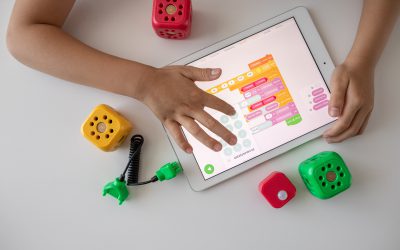Now the schools are closed: homeschooling for us all?
10 Apr 2020 | Professionals
A few years ago, in the project Thuis in School (Vrije Universiteit Amsterdam), when we conducted research with parents and schools on parental engagement in the education process, there was no way we could have guessed what we’d be seeing now. Parents and teachers are trying to prevent the Corona virus measures from having an adverse impact on children. This suddenly gives parental engagement an entirely different dimension.
26-03-2020

And the teacher now suddenly finds they have a large group of colleagues. It is now the parents who are present “in the classroom” when the assignments are made. Parents must now ensure a good learning climate and support the learning attitude. In the lower years, it is the parent who has to actively participate in the activities with the children.
While it’s possible to transfer the teaching material for lessons via a pile of books, digital learning methods, e-mail or knowledge clips, how do you agree with parents what is feasible and what is not? And how can you support parents remotely in their new role? Because as a teacher, it makes sense that your first thought is: how can parents help me to continue fulfilling my teaching task? But then you can then go on to think: as a teacher, how can I best support the children and parents that this is happening to?
Our research and practical experiences in educational partnerships potentially offer answers to this unique situation. This research shows that parental engagement in the learning process contributes positively to the development of the child . This requires good coordination between parents and teachers – in other words, an educational partnership – and two things are of the utmost importance in this: two-way communication and knowledge sharing.
Many teachers will have a contact moment with the children and parents this coming week by phone, internet chat or other online medium. Some parents might perceive this as if they are being checked up on. Perhaps the following tips will help in the conversation to ensure parents feel supported and see new opportunities to get to work. If it succeeds, it’s a win-win, for parents, children and teachers!
Communication is a two-way street
Now that parents and pupils are provided with information remotely, it becomes even more tempting to send unlimited amounts of information. Without direct contact, however, it’s difficult to see how the information lands. Good communication between parents and teachers is characterised by openness, clarity, equality and attention for the differences between parents (or groups of parents).
Tips for teachers to help create openness and clarity:
1. Provide parents with insight into your plan for the coming period and the limitations you will be up against. What channels will you use to contact them and how can they contact you? What do you expect from parents and what can they expect from you? Realise that parents may have several children and may therefore be dealing with conflicting expectations.
2. Recognise your equality with parents by establishing two-way communication . This could be tricky, especially if parents are less digitally proficient, so opening a chat channel or an e-mail address might not be enough. Direct telephone or video contact is needed to find out whether what you are asking the children and parents to do is feasible. There’s so much that families are dealing with all at once. At the same time, as a teacher, you provide important support in finding a new structure, distracting from the fear of the situation, persisting with social distancing and breaking through the social isolation. However, this won’t be without its challenges. For parents, it is important that teachers are aware of this and understand it.
3. Recognise that parents are experts in running their particular version of family life. In some families, it may not be possible to do all the maths assignments, but children do help out with cooking and household chores. As a teacher, you are perfectly capable of teaching parents how to make these tasks educational. For example, there is plenty to count and calculate while cooking. Parents’ professional knowledge and skills are now also becoming a great educational resource.
4. Many parents may adapt to the situation very well. Their good ideas can inspire other parents, and you can invite them to share their approach, activities, experiments, or self-designed assignments with you by sharing photos, videos, or stories. Do remember to ask for permission if you want to share these examples with other parents. Nevertheless, you are contributing to the self-confidence of parents and acknowledging that in this situation it is now the parents’ turn to step up.
Sharing knowledge
Parents are more effective when they are taught how to guide their child through assignments . Teachers are easily able to make basic teaching knowledge accessible to parents. It is important, however, that parents are able to match the explanation with children’s perceptions and level of understanding. You can help parents do this by using examples or sharing experiences . The longer home schooling takes, the more examples there will be. Some tips:
1. Tone of the instruction and atmosphere: Teach parents that the success of the activity depends not only on the activity itself, but also on the instructions and the atmosphere . Give examples (from your own experience or from the experience of parents) which help create a positive and rewarding learning climate, and support the autonomy of children. This allows parents who are not used to this to learn to encourage their child and give them the space to make their own choices (e.g. planning activities). You can also share your own knowledge about what instructions are helpful (with the assignment), such as asking open questions that provoke children to describe something (What kind of sum is this?), asking children to make their approach explicit (What steps are you going to take to solve the sum?), and asking children to explain why they do things the way they do (Why do you count everything in the brackets first?). Some parents may not immediately think that making mistakes is instructive. It can then help to explain that it is useful for children to make mistakes, and especially to allow them track down their own mistakes.
2. Ask parents about the learning process. To monitor the learning process and make parents aware of how they are guiding their child, you could ask parents for feedback . Does your child work independently or do you do the work together? What questions did you ask your child during this assignment? How did your child respond? Does your child find it difficult to do the work? How was it for you to help your child with the work? As a teacher, you know very well what children need to help them get started. Sometimes that’s a challenge, and sometimes it’s just a question of making a start together, or repeating the instructions again a little later. By sharing this with parents, you help parents in their new role. And it helps the teacher too. Precisely by showing interest in stories, concerns and questions from parents, you can keep an eye on the learning process and discover where the bottlenecks are, so that you can pay extra attention to them in new homework assignments or later, when the schools have started again.
Finally, expressing appreciation for parents contributes to equality, and can help parents stay motivated in this unprecedented situation. We’re in the same precarious boat together. By bringing schooling home, parents and children are doing themselves, their loved ones and society a huge service. That alone is a rightful source of pride. This crisis is happening to us now. Teachers work with parents on the daily routine, distractions and staying indoors. All the learning goals that can still be achieved now are a bonus, while health and safety are the primary concern.
The project ‘Thuis in School’ has been carried out as part of LEARN! by Marina Ilias and a project team including Agnes Willemen, Marjolein Dobber, Mirjam Oosterman, Trees Pels and Carlo Schuengel. This study was part-financed by the National Coordinating Body for Educational Research (‘Nationaal Regieorgaan Onderwijsonderzoek’).
[1] Bakker, J. T. A., Denessen, E. J. P. G., Dennissen, M. H. J., & Oolbekkink-Marchand, H. W. (2013). Leraren en ouderbetrokkenheid: Een reviewstudie naar de effectiviteit van ouderbetrokkenheid en de rol die leraren daarbij kunnen vervullen. Nijmegen, Radboud Universiteit. https://hdl.handle.net/2066/121840
[2] Willemen, A.M. & Ilias, M.A.H (2019). Thuis in School. Onderzoeksverslag praktijkgericht onderzoek. Amsterdam: Vrije Universiteit.
[3] Iliás, M., Willemen, A., Dobber, M., Pels, T., Oosterman, M., & Schuengel, C. (2016). Een schoolleergemeenschap met leerkrachten en ouders. Pedagogiek, 36(3), 307-337.
[4] Epstein, J.L. (2011). School, family, and community partnerships: Preparing educators and improving schools, 2nd ed., Boulder, CO: Westview
[5] Herweijer, L., & Vogels, R. (2013). Ouders en scholen over samenwerking in basisonderwijs, voortgezet onderwijs en middelbaar beroepsonderwijs. Den Haag: Sociaal en Cultureel Planbureau.
[6] Menheere, A., & Hooge, E.H. (2010). Parental involvement in children’s education: A review study about the effect of parental involvement on children’s school education with a focus on the position of illiterate parents. Journal of European Teacher Education Network, 6, 144-157.
[7] Iliás, M., Willemen, A., Dobber, M., Pels, T., Oosterman, M., & Schuengel, C. (2016). Een schoolleergemeenschap met leerkrachten en ouders. Pedagogiek, 36(3), 307-337.
[8] Bailey, L. B. (2006). Interactive homework: A tool for fostering parent–child interactions and improving learning outcomes for at-risk young children. Early Childhood Education Journal, 34(2), 155.
[9] Iliás, M., Willemen, A., Dobber, M., Pels, T., Oosterman, M., & Schuengel, C. (2016). Een schoolleergemeenschap met leerkrachten en ouders. Pedagogiek, 36(3), 307-337.
[10] De Jong, P. F., & Leseman, P. P. (2001). Lasting effects of home literacy on reading achievement in school. Journal of School Psychology, 39(5), 389-414.
[11] Spruijt, A. M., Ziermans, T. B., Dekker, M. C., & Swaab, H. (2020). Educating parents to enhance children’s reasoning abilities: A focus on questioning style. Journal of Applied Developmental Psychology, 66, 101102.
See also information for:
Most recent blogs:
How LEARN! supports primary and secondary schools in mapping social-emotional functioning and well-being for the school scan of the National Education Program
Jun 28, 2021
Extra support, catch-up programmes, learning delays, these have now become common terms in...
Conference ‘Increasing educational opportunities in the wake of Covid-19’
Jun 21, 2021
Covid-19 has an enormous impact on education. This has led to an increased interest in how recent...
Educational opportunities in the wake of COVID-19: webinars now available on Youtube
Jun 17, 2021
On the 9th of June LEARN! and Educationlab organized an online conference about...
Homeschooling during the COVID-19 pandemic: Parental experiences, risk and resilience
Apr 1, 2021
Lockdown measures and school closures due to the COVID-19 pandemic meant that families with...
Catch-up and support programmes in primary and secondary education
Mar 1, 2021
The Ministry of Education, Culture and Science (OCW) provides funding in three application rounds...
Home education with adaptive practice software: gains instead of losses?
Jan 26, 2021
As schools all over Europe remain shuttered for the second time this winter because of the Covid...

